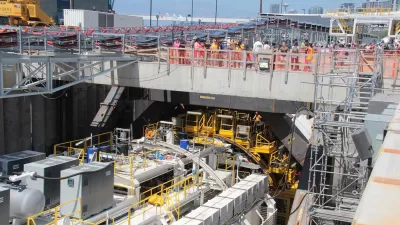Though Seattle's giant tunneling machine remains stuck 60 feet under South Main Street, muck is starting to be flung above the surface. An email from Washington's Transportation Secretary reveals concerns over the conduct of the machine's operators.
As the mystery behind what's blocking Seattle's tunnel-boring behemoth remains unsolved more than 6 weeks after digging was halted in the area beneath Pioneer Square, questions are being raised about contractor Seattle Tunnel Partners' (STP) operations in the months prior to the work stoppage. "State Transportation Secretary Lynn Peterson says the agency 'has had concerns' about how contractors have been operating tunnel-boring machine Bertha since July 30, when drilling began," reports Mike Lindblom.
In an email sent last week to state lawmakers, Peterson remarked that:
WSDOT has had concerns about the machine’s operations and critical systems since its launch on July 30, 2013. We have discussed these concerns with STP frequently over the past five months and this week sent a formal letter stating our concerns and asking STP how they will address them prior to tunneling under the viaduct and downtown. We are providing you [elected officials] with this information in lieu of a copy of the letter because it could be the subject of a potential future litigation between WSDOT and the contractor.
"Chris Dixon, project director for STP, didn’t comment Wednesday on Peterson’s message," notes Lindblom. "But earlier Wednesday, he said the contractors think something in the soil, as opposed to mechanical trouble, is to blame for the stall." Reports earlier this month suggested that an eight-inch metal pipe was responsible for the stoppage.
FULL STORY: State questions Bertha strategy, sees ‘potential future litigation’

Planetizen Federal Action Tracker
A weekly monitor of how Trump’s orders and actions are impacting planners and planning in America.

Maui's Vacation Rental Debate Turns Ugly
Verbal attacks, misinformation campaigns and fistfights plague a high-stakes debate to convert thousands of vacation rentals into long-term housing.

San Francisco Suspends Traffic Calming Amidst Record Deaths
Citing “a challenging fiscal landscape,” the city will cease the program on the heels of 42 traffic deaths, including 24 pedestrians.

Amtrak Rolls Out New Orleans to Alabama “Mardi Gras” Train
The new service will operate morning and evening departures between Mobile and New Orleans.

The Subversive Car-Free Guide to Trump's Great American Road Trip
Car-free ways to access Chicagoland’s best tourist attractions.

San Antonio and Austin are Fusing Into one Massive Megaregion
The region spanning the two central Texas cities is growing fast, posing challenges for local infrastructure and water supplies.
Urban Design for Planners 1: Software Tools
This six-course series explores essential urban design concepts using open source software and equips planners with the tools they need to participate fully in the urban design process.
Planning for Universal Design
Learn the tools for implementing Universal Design in planning regulations.
Heyer Gruel & Associates PA
JM Goldson LLC
Custer County Colorado
City of Camden Redevelopment Agency
City of Astoria
Transportation Research & Education Center (TREC) at Portland State University
Jefferson Parish Government
Camden Redevelopment Agency
City of Claremont



























